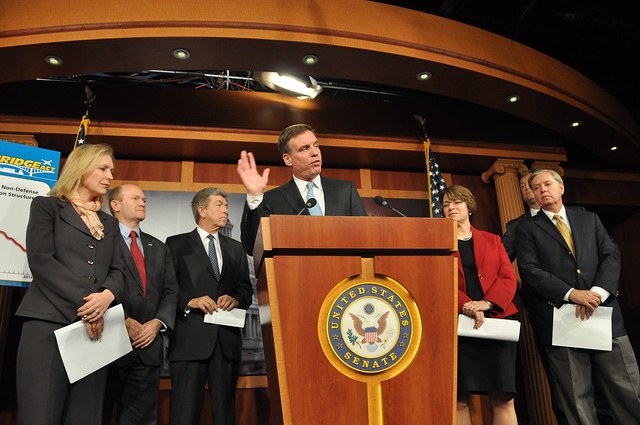Press Releases
WASHINGTON – U.S. Sen. Mark R. Warner (D-VA) led a bipartisan coalition of ten Senators today in introducing legislation to establish a new infrastructure financing authority to help states and localities better leverage private funds to build and maintain the nation’s outdated infrastructure. The Building and Renewing Infrastructure for Development and Growth in Employment Act, or BRIDGE Act, helps to address the nation’s alarming investment shortfall in maintaining and improving our transportation network, water and wastewater systems and energy infrastructure. The legislation would provide an additional financing tool for states and localities which can create new jobs here at home while also increasing our nation’s economic competitiveness.
“The BRIDGE Act is not a ‘silver bullet’ to magically close America’s infrastructure gap, but this bipartisan proposal creates smart new tools to help our states and localities unlock billions of dollars in additional private investments at a time of very favorable interest rates,” Sen. Warner said. “The BRIDGE Act will not only put Virginians and Americans back to work but also help to expand U.S. commerce and trade, keeping American businesses competitive and creating even more jobs here at home. The BRIDGE Act demonstrates our willingness to work together in a responsible, bipartisan way to get moving on important investment priorities.”
The BRIDGE Act, introduced by lead sponsors Sens. Warner and Roy Blunt (R-MO), is cosponsored by Lindsey Graham (R-SC), Kirsten Gillibrand (D-NY), Dean Heller (R-NV), Chris Coons (D-DE), Amy Klobuchar (D-MN), Roger Wicker (R-MS), Claire McCaskill (D-MO) and Mark Kirk (R-IL). The legislation has been endorsed by a wide variety of stakeholders and industry groups, including the Transportation Construction Coalition, American Association of Port Authorities, American Trucking Association, American Society of Civil Engineers, and the Bipartisan Policy Center. A full list of groups endorsing the BRIDGE Act is available here.
“Infrastructure has long been an integral part of our economy. Successful transportation systems connect people and communities, and businesses large and small, and the jobs they create, rely on a strong infrastructure network to connect with their customers,” Sen. Blunt said. “This bipartisan legislation will provide a new tool to help finance infrastructure projects, create jobs, and ensure America’s global competitiveness in the 21st century.”
America currently spends roughly two percent of its GDP on infrastructure -- about half what it did 50 years ago. By comparison, Europe spends around 5%, and China spends 9% of GDP on infrastructure. According to the World Economic Forum’s Global Competitiveness Report, the United States currently ranks 19th among 148 developed countries in overall infrastructure compared to our global competitors.
To begin addressing this shortfall, the BRIDGE Act will establish an independent, nonpartisan financing authority to complement existing U.S. infrastructure funding. The authority would provide loans and loan guarantees to help states and localities fund the most economically viable road, bridge, rail, port, water, sewer, and other significant infrastructure projects. The authority would receive initial seed funding of up to $10 billion, which could incentivize private sector investment and make possible up to $300 billion in total project investment. The authority is structured in a way to make it self-sustaining over time.
KEY PROVISIONS
The BRIDGE Act includes broad eligibility for funding:
Projects would have to be at least $50 million in size, and be of national or regional significance to qualify. Five percent of the Authority’s overall funding would be dedicated to projects in rural regions, and rural projects would be required to be $10 million in size.
The BRIDGE Act addresses current gaps in infrastructure financing
The Authority would finance no more than 49 percent of the total costs of the project in order to avoid crowding out private capital. Loans and loan guarantees would be subject to modest additional fees, which will allow the Authority to quickly become self-sustaining over time.
The BRIDGE Act establishes independent, non-partisan operations:
Having project finance experts in-house will help states and localities go toe-to-toe with private sector partners to ensure that taxpayers are getting good value for our investments through public-private partnerships. The Authority would operate independently of existing federal agencies, led by a Board of Directors with seven voting members and a CEO, all of whom would be required to demonstrate proven expertise in financial management and be confirmed by a vote of the Senate.
